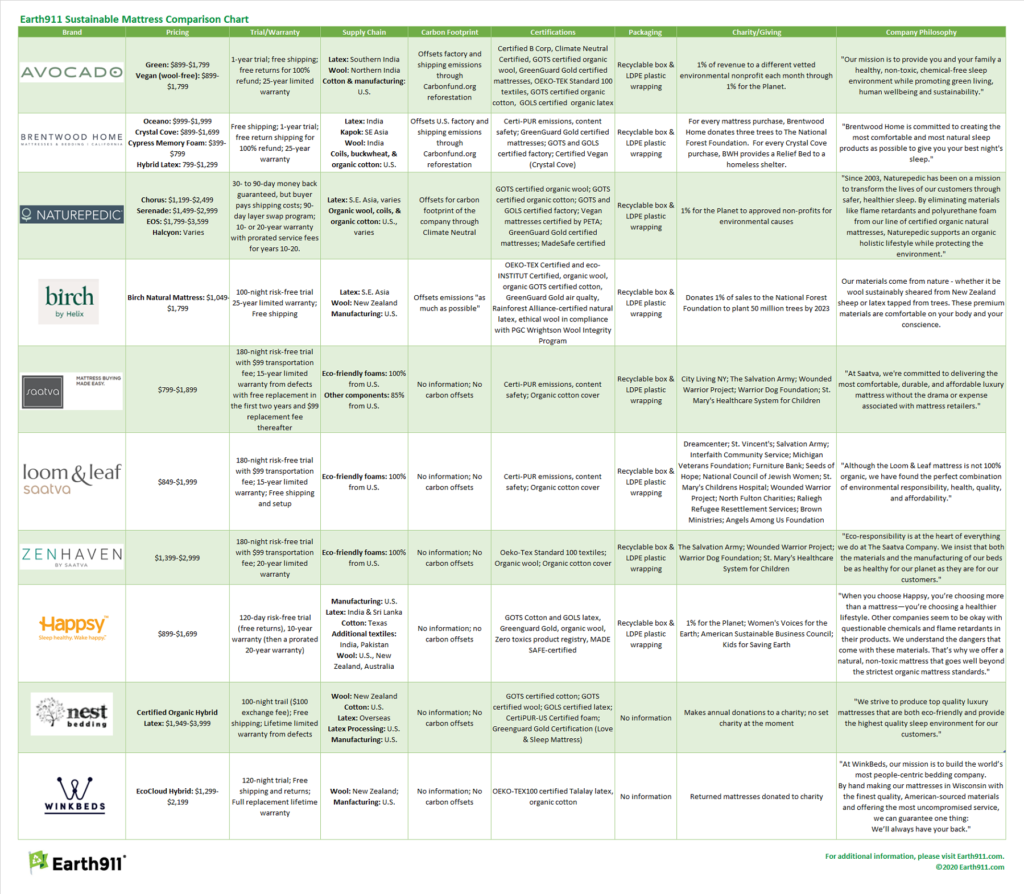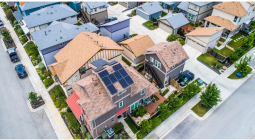10 Sustainable Mattress Companies: Choosing Your Perfect Green Sleep.

Sleep is bliss, but it isn’t always environmentally responsible. Many mattresses contain a toxic brew of chemicals — from flame-retardant chemicals like polybrominated diphenyl ethers to formaldehyde and mercury — as well as petroleum-based ingredients. In recent years, sustainable mattress companies have risen to the challenge of making a clean, earth-friendly bed.
Some of these environmentally responsible companies sell “mattresses-in-a-box,” which are delivered in a small box and expand. Earth911 collected supply chain, certification, and manufacturing details for 10 sustainable mattress manufacturers to help shoppers find the best earth-friendly sleep. We’ve filtered out all companies that do not make an explicit promise that their products are green and healthy.
The results — displayed below in a printable chart — reveal a wide range of options for earth-friendly beds. This article contains affiliate links to products that, if you make a purchase, support Earth911’s editorial mission.
Comparison Chart
To view our complete printable comparison chart, click the image below.

Our Rating Criteria
The factors we considered when assessing the environmental-friendliness and sustainability include the following keystones.
Company Supply Chain
The length of the company supply chain describes the distance materials are shipped before and after the mattress is manufactured. In all cases, the sustainable mattress companies in our list assemble their products in the United States, minimizing the post-manufacturing shipping burden. Shorter shipping distances contribute fewer CO2 emissions to the atmosphere. Several of the companies — including Saatva, Loom & Leaf (owned by Saatva), and ZenHaven (owned by Saatva) — use materials processed in the U.S.
Carbon Emissions Offsets
A second supply chain consideration is whether the mattress maker offsets their shipping and manufacturing carbon emissions with carbon credits or carbon sequestration programs, such as reforestation. Only Avocado and Brentwood Homes, which is owned by Avocado Brands, actively offset their company carbon emissions.
Recyclable Mattress Materials
Recyclability of the mattress and materials is a common feature of sustainable mattresses. The latex, cotton, wool, and other materials in all the mattresses we reviewed are biodegradable. However, it is important to send a mattress to a responsible recycler to ensure that it does not end up in a landfill.
Recyclable Packaging Materials
Recyclability of mattress-in-a-box packaging is generally good. Every company we reviewed offers recyclable boxes and plastic wrapping in which the mattress ships. You may receive one, two, or more boxes in your order, but all the packaging should be easy to recycle.
Mattress Recycling Services
Old mattress recycling services are not required in 47 states — only California, Rhode Island, and Connecticut have laws on the books requiring removal and recycling of an old mattress. Those states also charge a fee at purchase that ensures no-charge recycling at the mattress’ end of life. Several companies in our review go beyond what is required by law and offer free recycling of an old mattress: Saatva, ZenHaven, and Loom & Leaf. Happsy and Spindle collaborate with 1-800-GOT-JUNK to provide removal services for a fee, while the rest of the companies do not offer mattress removal.
Charity and Giving
Charity and giving programs are another important feature of a responsible company. Returned mattresses cannot be resold, so every company has a donation program to dispose of returned mattresses responsibly. Shoppers also want to know that their spending is supporting ethical business practices, which often involve extensive charitable giving. With active giving ranging from 1% for the Planet to extensive networks of charitable programs supported by most of the mattress makers in our comparison, you can find a sustainable mattress that aligns with your values.
Company Philosophy
Company philosophies are important in understanding what you are buying. We’ll include these in the discussion of individual companies in the rankings.
Certifications: Safety First
Certifications are essential guidelines for mattress buyers. Consumer Reports provides a comprehensive summary of mattress materials certifications to look for when shopping. For a second opinion, read Triple Pundit’s assessment of the certifications for mattresses, many of which are forms of greenwashing.
Seek out products that have the following certifications:
- Global Organic Textile Standard (GOTS) covers the processing, manufacturing, packaging, labeling, trading, and distribution of all textiles made from at least 70 percent certified organic natural fibers.
- Global Organic Latex Standard (GOLS) outlines requirements for latex products. To achieve GOLS certification, a product must contain more than 95 percent certified organic raw material and comply with permissible limits for harmful substances, emission test requirements, and polymer and filler percentages.
- CertiPUR-US certification of the foam used in the mattress. The CertiPUR-US seal ensures the mattress foam you or your kids sleep on is made without chemical flame retardants, mercury and other heavy metals, formaldehyde, or phthalates. CertiPUR-US also reviews the emissions, or “off-gassing,” by new mattresses for low volatile organic compound (VOC) emissions, less than 0.5 parts per million.
- OEKO-TEX Standard 100 certification addresses the safety and sustainability of textiles, such as cotton and wool, used in mattresses. The Standard 100 certification provides customers assurance that harmful chemicals and environmentally harmful substances are not produced by the manufacturing process or included in the product.
- eco-INSTITUT certification involves similar testing, measuring the emissions from the mattress, and the environmental responsibility of the sourcing of materials. In particular, eco-INSTITUT examines the sources of latex, which is harvested from rubber trees, used in mattresses.
- GREENGUARD Gold certification, from United Laboratories, validates that a mattress does not exceed the emission standards for VOCs that contribute to indoor pollution.
Earth911’s Sustainable Mattress Rankings
No single mattress is right for everyone and manufacturers take different approaches to delivering a sustainable mattress at the right price. You need to be aware of the trade-offs they make so that you arrive at the environmental outcome you want.
Completely organic materials are prohibitively expensive for many consumers and the length of supply chains varies dramatically. These two factors, along with certifications, are the most important to our general ranking of the companies. As noted, we’ll break out the top five options for different types of buyers in future articles. This ranking looks at the overall performance of each company and is not based on price.
#1 Avocado
Avocado offers a sustainable and certified-vegan version of its eponymous mattress. It is a Certified B Corporation and is Climate Neutral Certified. The mattresses are GREENGUARD Gold certified and OEKO-TEX textile safety. Its products use 100% GOTS organic certified cotton and wool, as well as hydrated silica as a natural fire retardant. The latex originates from Kochi, India, where it is cultivated and processed by Avocado Organic Latex. Mattresses are assembled and shipped from California. Avocado purchases carbon offsets through Carbonfund.org and uses easily recycled LDPE plastic in its packaging. As members of 1% for the Planet, Avocado donates 1% of its revenue to vetted environmental nonprofits. Avocado, followed closely by its subsidiary Brentwood Home, offers the most comprehensive green sleep products today.
#2 Brentwood Home (Avocado Brands)
Brentwood Home, an Avocado company, makes one of the two vegan mattresses (no wool) in our review: the Crystal Cove mattress. The company uses one of the most extensive supply chains among the companies we reviewed, but it makes an annual carbon offset payment to compensate for the shipping and manufacturing of its mattresses. It donates money to Carbonfund.org for reforestation projects that sequester carbon equal to its production footprint. Brentwood Home and Avocado also have the most extensive sustainability certifications — of the quality seals that matter — among companies reviewed here. Both companies emphasize the recyclability of their packaging and offer white-glove installation, which does not include old mattress removal and recycling.
#3 Naturepedic
Naturepedic is an excellent source of sustainable mattresses. The company has all the necessary certifications — including GOTS and GOLS sustainably made textile and latex and GreenGuard air quality tests. Naturepedic mattresses are generally more expensive than Avocado and Brentwood Home, making the brand a luxury choice for those looking for a long-lived high-quality mattress. Naturepedic works with Climate Neutral to measure and offset its carbon footprint. Because Naturepedic does not share its supply chain information in detail, Earth911 added them to this list in third place.
#4 Birch by Helix
Helix goes the extra mile to ensure sustainably sourced material, safe working conditions, and nontoxic mattresses. Materials include certified organic cotton, ethical wool, and sustainably farmed latex. The firm works with a variety of partners to ensure high standards and levels of certification, while also giving back through environmental charity giving programs.
#5 Saatva
Saatva, which operates several mattress manufacturers, has excellent materials sourcing processes and builds its mattresses at 19 different locations and 145 fulfillment locations in the U.S. On average, a mattress travels less than 100 miles from the factory to its new home, saving energy and supporting the local economy. This online-only mattress company sources nearly all its materials from North America. The company was founded to disrupt the mattress store business with less-hassle shopping online. Nevertheless, it has worked hard to build a sustainable mattress. Its latex foam, organic cotton, and wool sourcing — and use of recycled steel spring coils — make the Saatva mattress a very strong contender among the most affordable mattresses on the market. Saatva offers free “white-glove” installation and old mattress recycling.
#6 Loom & Leaf by Saatva
The mid-priced offering among Saatva’s mattress catalog, Loom & Leaf, like its parent company, relies exclusively on a North American-based supply chain for its products. The mattresses feature a natural thistle flame retardant instead of synthetic chemicals. Like Saatva, mattresses are manufactured across the U.S., dramatically reducing the distance the product travels when purchased. Their flagship factory is powered by solar panels. The company seeks to balance affordability with sustainability: “Although the Loom & Leaf mattress is not 100 percent organic, we have found the perfect combination of environmental responsibility, health, quality, and affordability.” Free white-glove delivery and old mattress removal service are other positives. Unfortunately, none of the Saatva companies offsets carbon emissions with credits or reforestation giving.
#7 ZenHaven by Saatva
At Saatva’s high end, ZenHaven “insist[s] that both the materials and the manufacturing of our beds be as healthy for our planet as they are for our customers.” The Talalay in its products is manufactured with a water-based process. ZenHaven has an extensive charity network and provides a free white-glove installation and mattress recycling service. Although manufactured by Saatva, Loom & Leaf and ZenHaven mattress compositions vary significantly and are manufactured in numerous locations in the U.S.
#8 Happsy
While it does rely on latex from Asia, Happsy encourages sustainable rubber plantation practices which, the company argues, lowers its carbon emissions. Shipping latex to its factory is its largest carbon footprint contributor. Happsy also buys organic cotton from a Texas growers’ collective. When possible, the company sources wool from U.S. suppliers but most of its wool comes from New Zealand and Australia. Happsy has an active partnership with 1-800-GOT-JUNK to arrange old mattress removal services for a fee or donation. A donor to 1% for the Planet and Women’s Voices for the Earth, among other nonprofits, Happsy is poised to rise in these rankings by adding carbon offsets.
#9 Nest
Another quality U.S. mattress manufacturer, Nest uses a nice array of organic materials. Their mattresses feature a lifetime warranty, excellent breathability, and phase-change cooling that makes it cool to the touch. With a design for waste reduction, each mattress features a zipper that allows customers to swap out or replace the comfort layer, significantly extending the life of the mattress. During the trial period, customers can even swap out the layer for a different feel. Nest recommends rotating the layer every six months to ensure more even wear on the mattress. With no recycling, official corporate giving, or carbon offset programs, Nest and EcoCloud by WinkBed are lower on the list.
#10 EcoCloud by WinkBed
Composed of Talalay latex and pocketed coils, with an organic cotton and wool cover, this mattress is known to wick moisture. The EcoCloud by WinkBed has an impressive list of certifications including OEKO-TEX, Rainforest Alliance, and GOTS-certified cotton but little information on how and where the materials are sourced.
Previously in Top 10
Tuft & Needle
Tuft & Needle is the darling of Silicon Valley, founded by sleep nerds who built a robust business with retail locations in several states. It makes great strides to ensure nontoxic ingredients and flame retardancy and it’s available on Amazon.com. However, it does not contain organic ingredients, offset its carbon emissions, or provide mattress recycling and offers little information on charitable giving.
Casper
Casper has created a sensation online, contributing to the popularity of mattress-in-a-box products through online and retail locations. Its engineers work to improve the comfort and sustainability of its mattresses, but the company does not publish extensive supply chain information to validate its materials sourcing and makes no investment in carbon offsets. We are, however, very impressed with Casper’s charitable efforts. The company has contributed more than 70,000 times to homeless and women’s shelter programs, as well as employee volunteers who work with Start Small Think Big as well as Women In Need. Casper can improve in the rankings with more transparency and an effort to reduce its overall carbon footprint and to source organic materials.
Spindle
Spindle does not pitch itself as making a certified organic mattress; rather, it focuses on using “natural” materials that achieve the best price. It also has one of the longest supply chains in the industry, sourcing latex and cotton from Central America, Asia, and India without any accompanying carbon offset efforts. However, its use of U.S. wool and, when possible, U.S.-grown cotton does minimize its carbon footprint when those supplies are available. It could improve in our rankings by offsetting its carbon footprint, offering free old mattress recycling service, and publishing information about its charitable programs.
26 October 2020
Earth911




